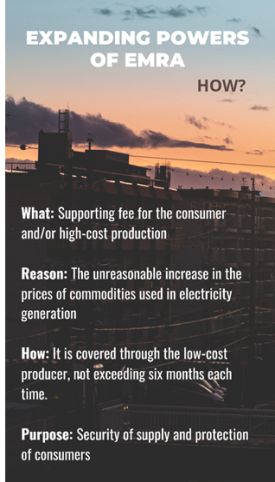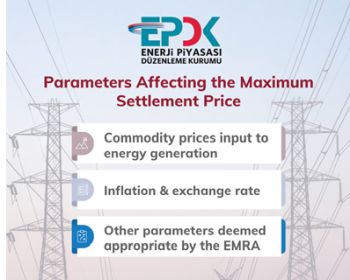- with readers working within the Oil & Gas industries
- within Energy and Natural Resources, Intellectual Property and International Law topic(s)
Our last article stated that one of the most discussed issues in the energy sector in 2022 would be the increase in energy prices1. This article touches upon this foreseen increase in electricity prices and how Energy Market Supervisory Board ("EMRA") intervenes to the electricity market.
Measures and precautions that can be taken have started to be discussed with the ringing alarm bells for electrical energy supply security due to the effects of the Covid-19 pandemic, harsh winter conditions, and the Russia-Ukraine war2. Coal prices, which were about 50 dollars per ton in international markets before July 2020, reached 410 dollars in March 2022, and natural gas prices, which were 190 dollars per thousand cubic meters, reached 1400 dollars. Unexpected increases in the prices of these commodities, used as inputs in electrical energy generation, primarily affect the end consumers. Efforts to reflect the rise in energy prices to consumers as of the end of 2021 in our country are incessant. While protecting the consumer from high prices, it also aims to ensure supply security.
1. Expanding powers of EMRA: Support fee will be charged to the generator with low generation cost
Before delving into the expanding powers of EMRA, we would like to mention certain measures and precautions that the European Union ("EU") introduced in relation to the increases in energy prices. In this regard, the "Energy Prices Toolbox" published by the European Commission ("Commission") in October 2021, offering the Member States both medium and short-term tools, was aiming to reduce the impact of the high prices on sensitive consumers3. In this context, the Commission offered Member States methods such as temporarily deferring bill payments, providing assistance to companies or industries by following the European Union state aid rules (State-Aids), and investigating possible anti-competitive behaviour in the energy market.
Recently, the European Commission has been guiding the Member States that they can adjust prices in exceptional circumstances and distribute high energy sector profits and income from emissions trading to consumers. The Commission will also consult with the Member States on the "Temporary Crisis Framework" to assist companies facing high energy costs4.

Upon global energy prices, the crisis spread to our country, and with the exchange rate fluctuations in the recent period, the powers of EMRA have been expanded with an amendment made in the Energy Market Law ("EML"). EMRA was authorized to determine a "support fee" to support supply security, costly generation, and/or consumers due to the "unreasonable" increases in the prices of commodities that enter electrical energy generation in national or international markets. It aims to ensure energy supply security by subsidizing other generators and consumer prices with support. As highlighted in the sub title, the fee will be collected from the electricity generators with a low generation cost. The issue underlined in the amendment's preamble is to ensure that generation facilities with costs above market prices can continue to provide electricity output. . However, we think that the legality and fairness of using this authority within the framework of establishing competition in the market and interfering with property rights is open to discussion.
2. New power to EMRA!
Following from the above, with the amendment made in the EML, EMRA can now determine a support fee for the consumers and/or high-cost generation on a resource basis by taking the assent of the Ministry of Energy ("MoE") with the following conditions:
- Unreasonable increases in the prices of commodities that are input to electrical energy generation and/or in differences between resource costs in national or international markets,
- For the security of supply and/or protection of consumers,
- Considering the generation costs of electrical energy,
- Not to exceed six months at each time.
Generators with low generation costs will cover the support fee, and the income will be used to support the security of supply, high-cost generation, and/or consumers. As a matter of fact, EMRA has used this new power by the promulgation of the "Procedures and Principles Regarding the Determination and Implementation of the Support Fee Based on Source" ("Decision")5, which was already amended with another Board Decision6. Herein, it should be noted that cross-subsidy policies signalling inefficiencies and losses in the market would not be sustainable and we believe that, the support fee under any name shall be allocated from the national budget.
The personal scope (ratione personae) of the obligation to pay support fee is stated in EML as "generators with low generation costs". Although the relevant Decision of EMRA covers licensed generation facilities, those who meet the following conditions (in relation to facilities and sales amount) are excluded from the scope of the Decision:
- Generation facilities within the scope of YEKDEM,
- Generation facilities included in the portfolio of Elektrik Üretim Anonim Şirketi7 ("EÜAŞ"),
- The sales amounts of the generation facilities that have signed an energy sales agreement with EÜAŞ directly or indirectly through the supplier,
- Amounts are declared based on the generation facility regarding the net sales positions realized in the forward electricity market before 08.03.2022. The delivery periods within the implementation period are subject to the support fee.
Although the conformity of the authority in the law is controversial with the Constitution, especially in terms of the legality of the tax, considering the width of the power, there is a possibility that EMRA may expand the "support cost based on resources" obligations. This situation raises many questions/issues in the context of the principle of legal certainty. The amendment of the Law, which allows EMRA to determine the scope of the regulation, needs to be examined in terms of the European Convention on Human Rights/Constitution and law-making technique.
The point that draws attention here is that the Ministry cannot detect the situations in which the consumer is adversely affected due to unreasonable increases. On the other hand, EMRA cannot determine the cases in which supply security is adversely affected. Otherwise, there is a possibility that the action will be unlawful in terms of procedure.
3. Who identifies the unreasonable increase?
The implementation of the support fee is subject to certain preconditions. First, there must be "unreasonable" increases in the prices of commodities and/or resource costs that are inputs for electric energy generation in the national or international markets. In cases where these "unreasonable" increases;
- has been determined by the Ministry and notified to the EMRA that it would adversely affect the security of supply, and/or
- has been determined by the EMRA that it will adversely affect the consumers, by taking the opinion of the Ministry,
support fee can be applied for six months. EMRA used its authority to determine the "support fee" for six months starting from 01.04.2022 to support the consumer and/or high-cost generation8.
4. How is the support fee calculated?
There are two concepts in calculating the support cost: "maximum settlement price" and "support fee". Accordingly, the "maximum settlement price" will be determined by EMRA taking into account the generation costs for resource types. The "maximum settlement price" for multi-source facilities will be determined according to the primary resource. This determined price will be updated by taking into account one or more of the parameters:
- Commodity prices input to energy generation
- inflation
- exchange rate
- other parameters deemed appropriate by the EMRA.
EMRA has been declared an extensive and aggressive Decision regarding updating the settlement price. EMRA also determined the maximum settlement prices as approx. $ 170 per MV for natural gas power plants and imported coal power plants and approx. $ 81 per MV for other power plants.
The support fee is considered a financial burden on low-cost electricity generators. In this respect, it can be argued that there is a tax-like obligation, and taxes can only be promulgated by law.

The support amount to be paid is calculated by multiplying the obligator's "delivery amount based on the support price" (The amount remaining after deducting the self-consumption amounts, if any, and the amount of energy subject to the direct or indirect energy sales contract with EÜAŞ, if any, from the electricity generated and supplied to the system) and the difference between the market exchange price or a fixed price determined by bilateral agreements and the maximum settlement price. This amount will be included in the invoice issued by Enerji Piyasaları İşletme A.Ş9 (Energy Markets Operations Inc., "EPİAŞ") as the "support fee debt amount". EPİAŞ will reflect this price as "the generation support amount" primarily to the market participants who own high-cost generation facilities to ensure supply security. Generators to be supported as per the EMRA decision; are those that are higher than the maximum settlement price (2.500 TL/MWh) determined in accordance with the "Procedures and Principles for Determining Minimum and Maximum Price Limits in the Day-Ahead Market and Balancing Power Market" based on the settlement period.
The remaining amount after the support of high-cost generation facilities will be reflected by the incumbent supplier companies in the ratio of the withdrawal amounts of the;
- Non-eligible consumers
- Eligible consumers who have not chosen their supplier,
- Eligible consumers within the scope of the last resource supply
- Consumers who want to obtain energy through tariffs determined to support renewable energy sources
pursuant to the Electricity Market Balancing and Settlement Regulation.
As per the stated regulation, thermal power plants, natural gas cycle power plants, and incumbent supply companies will be subsidized with the income of the facilities generating electricity from renewable energy sources that are not within the scope of YEKDEM. EMRA used this authority only to favor the incumbent supplier companies in the first implementation period.
5. What does this mean for the investors?
As electricity generation requires a capital-concentrated invesment and it might take a lont time to expect a certain return from an investor point of view, legal certainty shall be secured with a long-term predictable market regulations. Although investors take into account the innate adjustments arising from policy changes and amendments in primary and secondary sources of law, they also anticipate from the policy makers not to endanger their investments already made according to the existing law and regulations. This line of reasoning was supported by the fundamental principle of law, namely "pacta sunt servanda" (e.g. "agreements must be kept", arguably the oldest principle of international law)10, which had been experienced back in the process of the transition from a structure based on "build operate transfer" with purchase guarantee to a competitive private sector. In this context, stranded costs, namely the purchase guarantees in this case, arising from the already existed agreements were covered by the budget.
Apart from the investor-related issues, let alone the possible international investment arbitration initiations within the scope of both the Energy Charter Agreement and the bilateral investment agreements, considering that fossil fuels will be the primary energy sources of electricity generation plants supported by the implementation of the support fee, net-zero emission targets for the Paris Agreement ratified in 2021 in Turkey, will be at risk. Finally, it is seen that this regulation affects the generators who will be the source of the said cross-subsidy and the investors who expect a certain return during the economic life of the plant.
We will be monitoring the implementation of the stated regulations and will keep you informed whether it is sufficient in combating energy prices crises or not!
Footnotes
1. Ardıyok, Ş., Kıl, İ.F., Yaldır, B. N.: What Came Out of Pandora's Box In The Turkish Electricity Market In 2021, 8 Şubat 2022, https://www.mondaq.com/turkey/renewables/1158452/what-came-out-of-pandora39s-box-in-the-turkish-electricity-market-in-2021 Date Accessed: 15.03.2022.
2. IEA closely monitoring Russia situation and its implications for energy markets: https://www.iea.org/news/iea-closely-monitoring-russia-situation-and-its-implications-for-energy-markets Date Accessed: 15.03.2022.
3. https://ec.europa.eu/commission/presscorner/detail/en/IP_21_5204 Date Accessed: 16.03.2022.
4. https://ec.europa.eu/commission/presscorner/detail/en/ip_22_1511 Date Accessed: 16.03.2022.
5. Board Decision dated 17/03/2022 and numbered 10866, which was published in the Official Gazette dated 18 March 2022 and numbered 31782.
6. Board Decision dated 29/03/2022 and numbered 10887 published in the Official Gazette dated 30 March 2022 and numbered 31794.
7. Elektrik Üretim Anonim Şirketi is a public corporation, 100% of which is owned by the treasury, established for the purpose of carrying out electricity generation activities in accordance with Turkey's general energy and economic policy.
8. Board decision dated 29.03.2022 and numbered 10888.
9. Established on March 18, 2015, EPİAŞ works for efficient, transparent, reliable, predictable and sustainable operation and development of energy markets. EPİAŞ provides market players a medium where they can make energy purchase and sale requests. Its task is to carry out market transactions in a transparent and regulatory manner and to establish a reference price. https://www.epias.com.tr/epias-kurumsal/hakkimizda/, Date Accessed: 11.04.2022.
10. https://www.oxfordreference.com/view/10.1093/oi/authority.20110803100300496 Date Accessed: 11.04.2022.
The content of this article is intended to provide a general guide to the subject matter. Specialist advice should be sought about your specific circumstances.


